PHYSIOLOGY 3: Blood Pressure, Diet, Body Weight, Hormones, and Health
VerifiedAdded on 2022/08/18
|9
|2495
|16
Report
AI Summary
This literature review examines the intricate relationship between diet, body weight, hormonal balance, and blood pressure. It begins by establishing the physiological functions of blood pressure, detailing the systolic and diastolic measures, and identifying standard blood pressure levels. The report highlights how dietary factors, such as high sodium and saturated fat intake, can elevate blood pressure and contribute to weight gain, increasing the risk of hypertension and arteriosclerosis. Furthermore, it delves into the influence of body weight on blood pressure, emphasizing the correlation between obesity and high blood pressure. The role of hormones, particularly the renin-angiotensin system (RAS), in regulating blood pressure and energy balance is also discussed. Pathological functions are explored, including how excess weight increases the heart's workload and the risk of type 2 diabetes, and how imbalances in hormones like aldosterone can lead to high blood pressure. The report concludes by outlining treatment strategies, such as dietary adjustments, exercise, and blood pressure monitoring, to manage the conditions discussed, using data to compare weight and blood pressure values of individuals. The review draws on various literature and data to support its findings.

PHYSIOLOGY 1
Blood pressure
Name
ID
Course
Unit
Lecturer
Date
Blood pressure
Name
ID
Course
Unit
Lecturer
Date
Paraphrase This Document
Need a fresh take? Get an instant paraphrase of this document with our AI Paraphraser
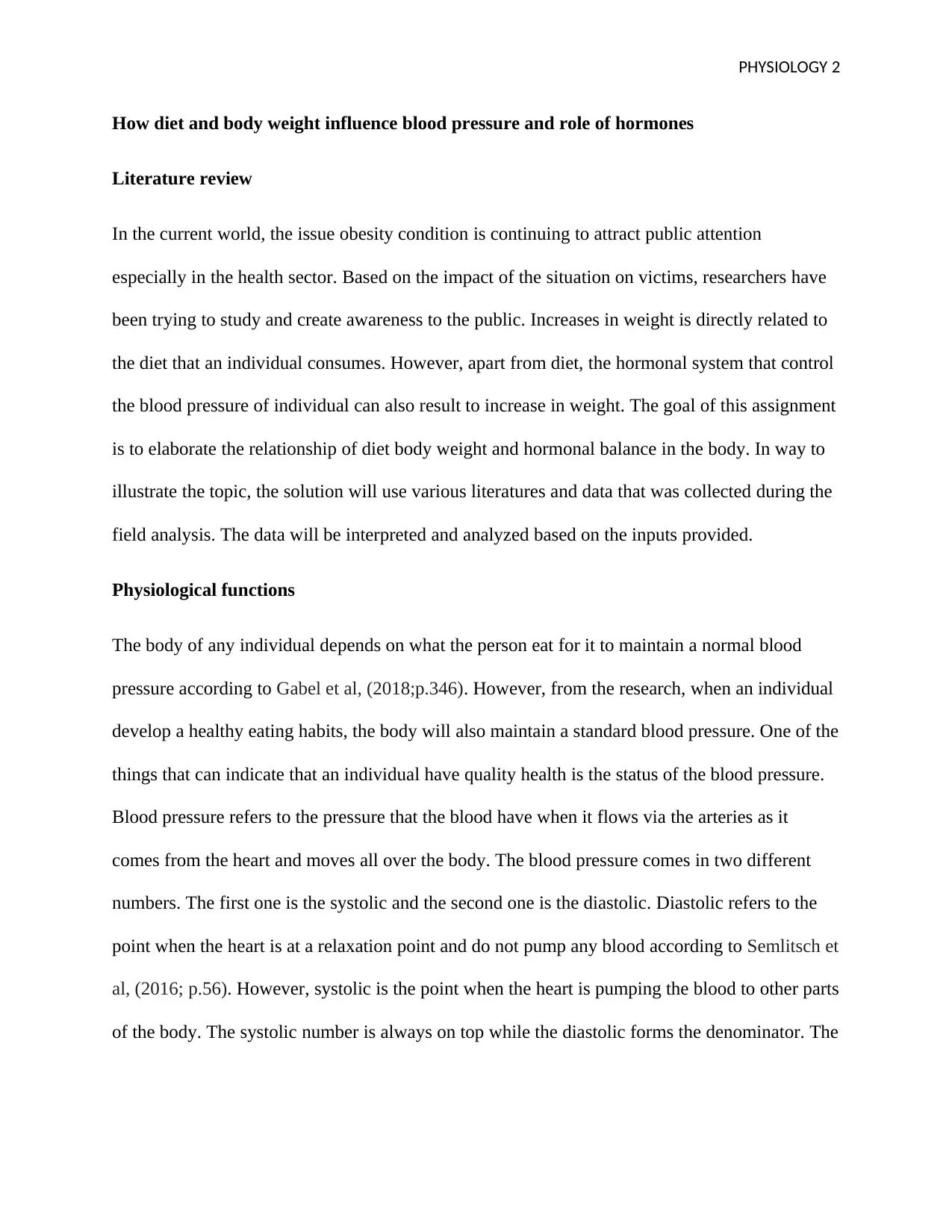
PHYSIOLOGY 2
How diet and body weight influence blood pressure and role of hormones
Literature review
In the current world, the issue obesity condition is continuing to attract public attention
especially in the health sector. Based on the impact of the situation on victims, researchers have
been trying to study and create awareness to the public. Increases in weight is directly related to
the diet that an individual consumes. However, apart from diet, the hormonal system that control
the blood pressure of individual can also result to increase in weight. The goal of this assignment
is to elaborate the relationship of diet body weight and hormonal balance in the body. In way to
illustrate the topic, the solution will use various literatures and data that was collected during the
field analysis. The data will be interpreted and analyzed based on the inputs provided.
Physiological functions
The body of any individual depends on what the person eat for it to maintain a normal blood
pressure according to Gabel et al, (2018;p.346). However, from the research, when an individual
develop a healthy eating habits, the body will also maintain a standard blood pressure. One of the
things that can indicate that an individual have quality health is the status of the blood pressure.
Blood pressure refers to the pressure that the blood have when it flows via the arteries as it
comes from the heart and moves all over the body. The blood pressure comes in two different
numbers. The first one is the systolic and the second one is the diastolic. Diastolic refers to the
point when the heart is at a relaxation point and do not pump any blood according to Semlitsch et
al, (2016; p.56). However, systolic is the point when the heart is pumping the blood to other parts
of the body. The systolic number is always on top while the diastolic forms the denominator. The
How diet and body weight influence blood pressure and role of hormones
Literature review
In the current world, the issue obesity condition is continuing to attract public attention
especially in the health sector. Based on the impact of the situation on victims, researchers have
been trying to study and create awareness to the public. Increases in weight is directly related to
the diet that an individual consumes. However, apart from diet, the hormonal system that control
the blood pressure of individual can also result to increase in weight. The goal of this assignment
is to elaborate the relationship of diet body weight and hormonal balance in the body. In way to
illustrate the topic, the solution will use various literatures and data that was collected during the
field analysis. The data will be interpreted and analyzed based on the inputs provided.
Physiological functions
The body of any individual depends on what the person eat for it to maintain a normal blood
pressure according to Gabel et al, (2018;p.346). However, from the research, when an individual
develop a healthy eating habits, the body will also maintain a standard blood pressure. One of the
things that can indicate that an individual have quality health is the status of the blood pressure.
Blood pressure refers to the pressure that the blood have when it flows via the arteries as it
comes from the heart and moves all over the body. The blood pressure comes in two different
numbers. The first one is the systolic and the second one is the diastolic. Diastolic refers to the
point when the heart is at a relaxation point and do not pump any blood according to Semlitsch et
al, (2016; p.56). However, systolic is the point when the heart is pumping the blood to other parts
of the body. The systolic number is always on top while the diastolic forms the denominator. The
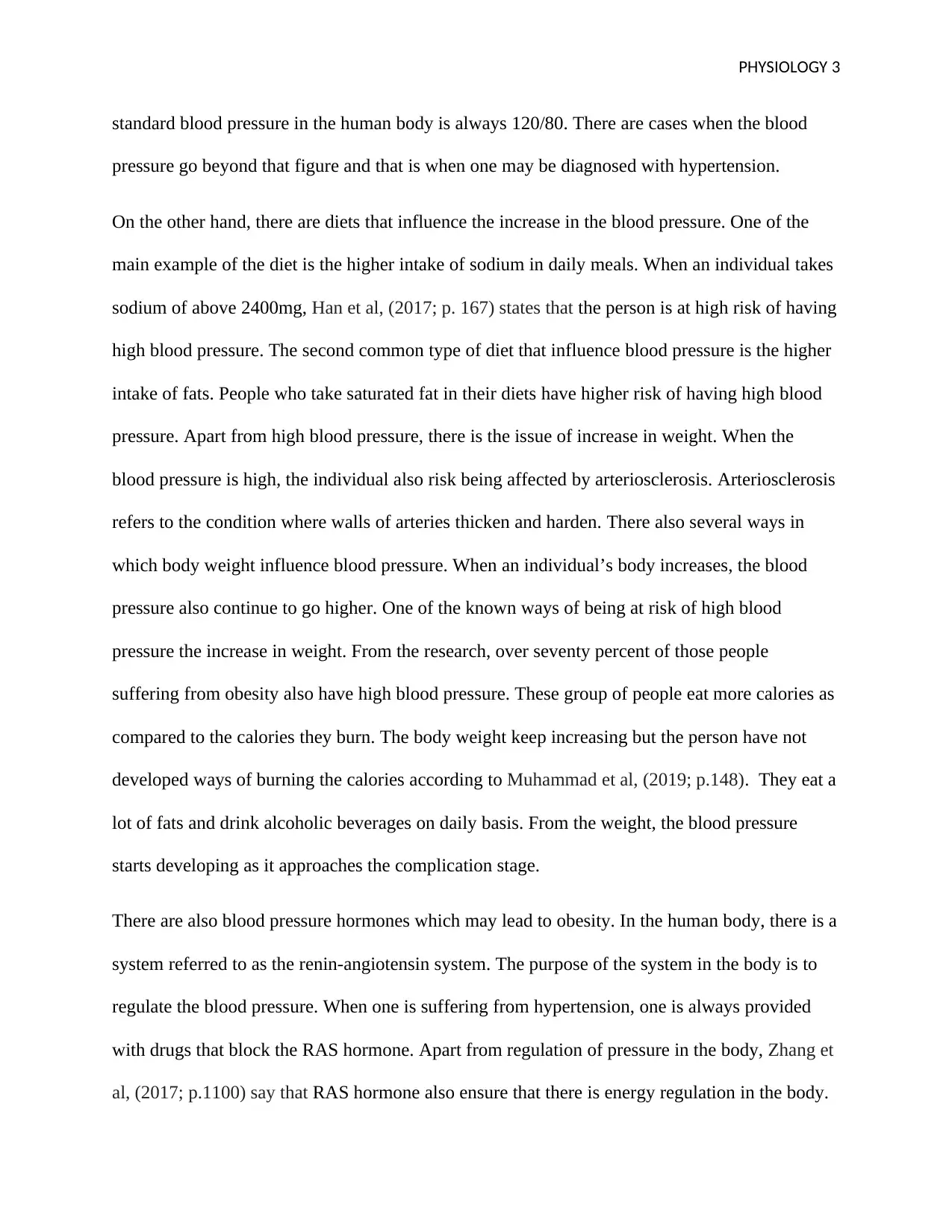
PHYSIOLOGY 3
standard blood pressure in the human body is always 120/80. There are cases when the blood
pressure go beyond that figure and that is when one may be diagnosed with hypertension.
On the other hand, there are diets that influence the increase in the blood pressure. One of the
main example of the diet is the higher intake of sodium in daily meals. When an individual takes
sodium of above 2400mg, Han et al, (2017; p. 167) states that the person is at high risk of having
high blood pressure. The second common type of diet that influence blood pressure is the higher
intake of fats. People who take saturated fat in their diets have higher risk of having high blood
pressure. Apart from high blood pressure, there is the issue of increase in weight. When the
blood pressure is high, the individual also risk being affected by arteriosclerosis. Arteriosclerosis
refers to the condition where walls of arteries thicken and harden. There also several ways in
which body weight influence blood pressure. When an individual’s body increases, the blood
pressure also continue to go higher. One of the known ways of being at risk of high blood
pressure the increase in weight. From the research, over seventy percent of those people
suffering from obesity also have high blood pressure. These group of people eat more calories as
compared to the calories they burn. The body weight keep increasing but the person have not
developed ways of burning the calories according to Muhammad et al, (2019; p.148). They eat a
lot of fats and drink alcoholic beverages on daily basis. From the weight, the blood pressure
starts developing as it approaches the complication stage.
There are also blood pressure hormones which may lead to obesity. In the human body, there is a
system referred to as the renin-angiotensin system. The purpose of the system in the body is to
regulate the blood pressure. When one is suffering from hypertension, one is always provided
with drugs that block the RAS hormone. Apart from regulation of pressure in the body, Zhang et
al, (2017; p.1100) say that RAS hormone also ensure that there is energy regulation in the body.
standard blood pressure in the human body is always 120/80. There are cases when the blood
pressure go beyond that figure and that is when one may be diagnosed with hypertension.
On the other hand, there are diets that influence the increase in the blood pressure. One of the
main example of the diet is the higher intake of sodium in daily meals. When an individual takes
sodium of above 2400mg, Han et al, (2017; p. 167) states that the person is at high risk of having
high blood pressure. The second common type of diet that influence blood pressure is the higher
intake of fats. People who take saturated fat in their diets have higher risk of having high blood
pressure. Apart from high blood pressure, there is the issue of increase in weight. When the
blood pressure is high, the individual also risk being affected by arteriosclerosis. Arteriosclerosis
refers to the condition where walls of arteries thicken and harden. There also several ways in
which body weight influence blood pressure. When an individual’s body increases, the blood
pressure also continue to go higher. One of the known ways of being at risk of high blood
pressure the increase in weight. From the research, over seventy percent of those people
suffering from obesity also have high blood pressure. These group of people eat more calories as
compared to the calories they burn. The body weight keep increasing but the person have not
developed ways of burning the calories according to Muhammad et al, (2019; p.148). They eat a
lot of fats and drink alcoholic beverages on daily basis. From the weight, the blood pressure
starts developing as it approaches the complication stage.
There are also blood pressure hormones which may lead to obesity. In the human body, there is a
system referred to as the renin-angiotensin system. The purpose of the system in the body is to
regulate the blood pressure. When one is suffering from hypertension, one is always provided
with drugs that block the RAS hormone. Apart from regulation of pressure in the body, Zhang et
al, (2017; p.1100) say that RAS hormone also ensure that there is energy regulation in the body.
⊘ This is a preview!⊘
Do you want full access?
Subscribe today to unlock all pages.

Trusted by 1+ million students worldwide
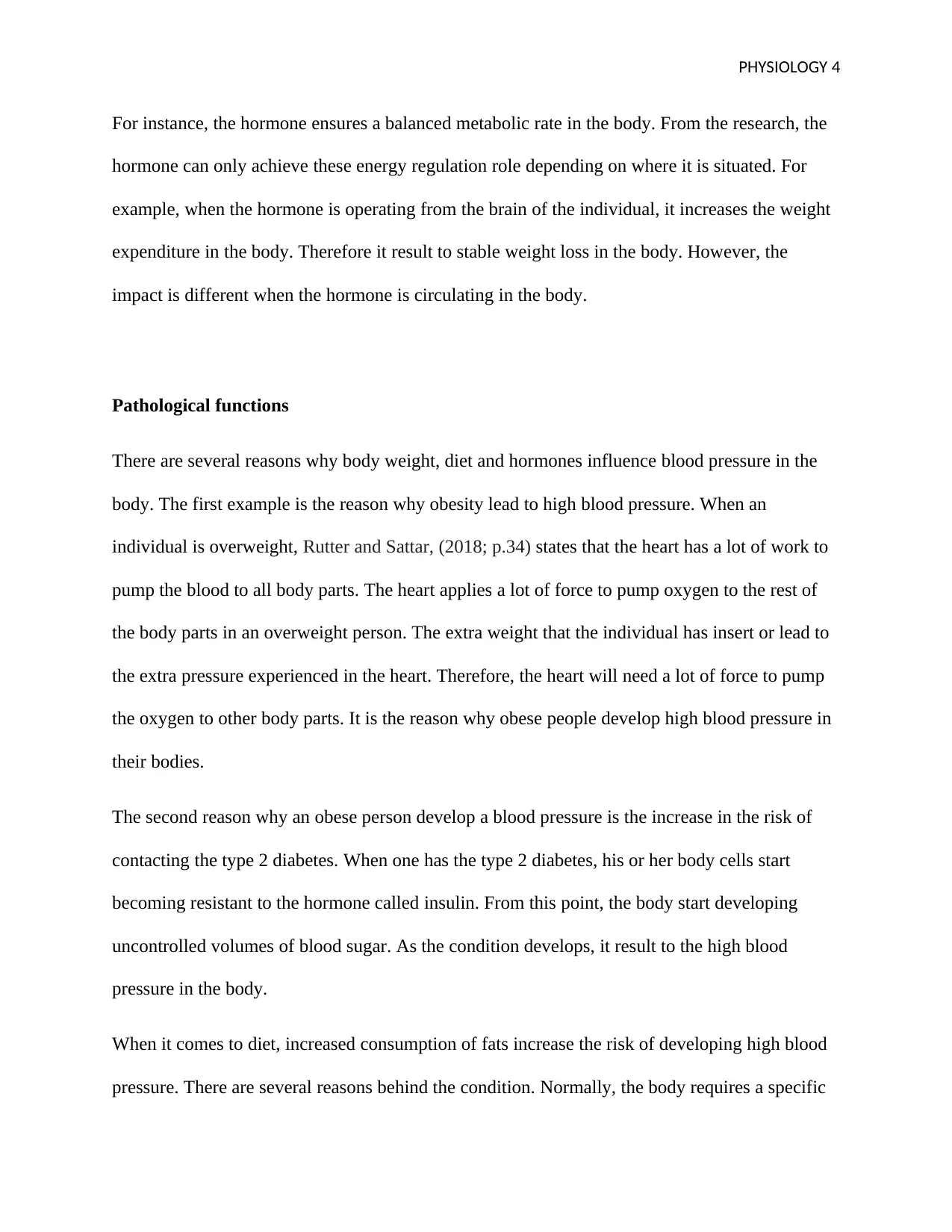
PHYSIOLOGY 4
For instance, the hormone ensures a balanced metabolic rate in the body. From the research, the
hormone can only achieve these energy regulation role depending on where it is situated. For
example, when the hormone is operating from the brain of the individual, it increases the weight
expenditure in the body. Therefore it result to stable weight loss in the body. However, the
impact is different when the hormone is circulating in the body.
Pathological functions
There are several reasons why body weight, diet and hormones influence blood pressure in the
body. The first example is the reason why obesity lead to high blood pressure. When an
individual is overweight, Rutter and Sattar, (2018; p.34) states that the heart has a lot of work to
pump the blood to all body parts. The heart applies a lot of force to pump oxygen to the rest of
the body parts in an overweight person. The extra weight that the individual has insert or lead to
the extra pressure experienced in the heart. Therefore, the heart will need a lot of force to pump
the oxygen to other body parts. It is the reason why obese people develop high blood pressure in
their bodies.
The second reason why an obese person develop a blood pressure is the increase in the risk of
contacting the type 2 diabetes. When one has the type 2 diabetes, his or her body cells start
becoming resistant to the hormone called insulin. From this point, the body start developing
uncontrolled volumes of blood sugar. As the condition develops, it result to the high blood
pressure in the body.
When it comes to diet, increased consumption of fats increase the risk of developing high blood
pressure. There are several reasons behind the condition. Normally, the body requires a specific
For instance, the hormone ensures a balanced metabolic rate in the body. From the research, the
hormone can only achieve these energy regulation role depending on where it is situated. For
example, when the hormone is operating from the brain of the individual, it increases the weight
expenditure in the body. Therefore it result to stable weight loss in the body. However, the
impact is different when the hormone is circulating in the body.
Pathological functions
There are several reasons why body weight, diet and hormones influence blood pressure in the
body. The first example is the reason why obesity lead to high blood pressure. When an
individual is overweight, Rutter and Sattar, (2018; p.34) states that the heart has a lot of work to
pump the blood to all body parts. The heart applies a lot of force to pump oxygen to the rest of
the body parts in an overweight person. The extra weight that the individual has insert or lead to
the extra pressure experienced in the heart. Therefore, the heart will need a lot of force to pump
the oxygen to other body parts. It is the reason why obese people develop high blood pressure in
their bodies.
The second reason why an obese person develop a blood pressure is the increase in the risk of
contacting the type 2 diabetes. When one has the type 2 diabetes, his or her body cells start
becoming resistant to the hormone called insulin. From this point, the body start developing
uncontrolled volumes of blood sugar. As the condition develops, it result to the high blood
pressure in the body.
When it comes to diet, increased consumption of fats increase the risk of developing high blood
pressure. There are several reasons behind the condition. Normally, the body requires a specific
Paraphrase This Document
Need a fresh take? Get an instant paraphrase of this document with our AI Paraphraser
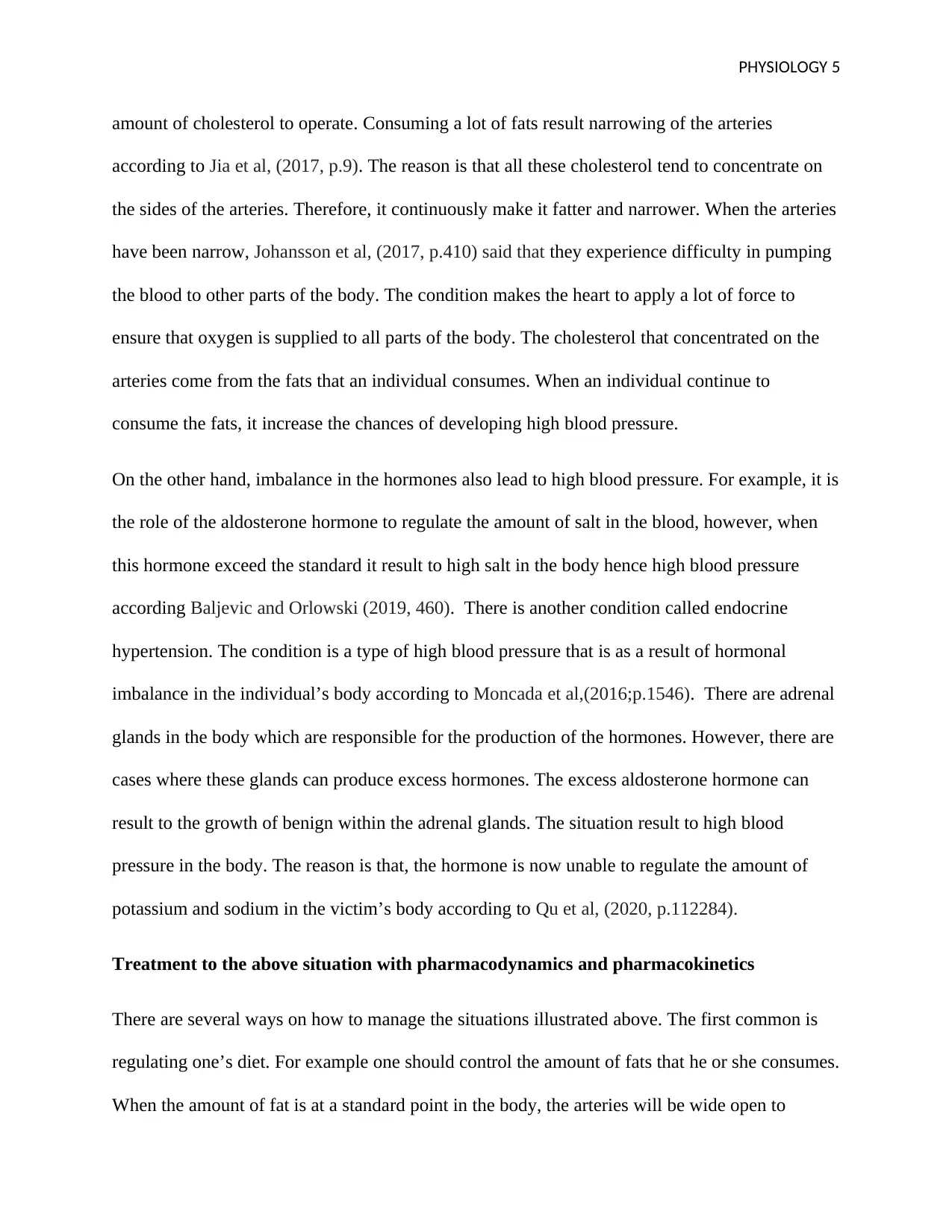
PHYSIOLOGY 5
amount of cholesterol to operate. Consuming a lot of fats result narrowing of the arteries
according to Jia et al, (2017, p.9). The reason is that all these cholesterol tend to concentrate on
the sides of the arteries. Therefore, it continuously make it fatter and narrower. When the arteries
have been narrow, Johansson et al, (2017, p.410) said that they experience difficulty in pumping
the blood to other parts of the body. The condition makes the heart to apply a lot of force to
ensure that oxygen is supplied to all parts of the body. The cholesterol that concentrated on the
arteries come from the fats that an individual consumes. When an individual continue to
consume the fats, it increase the chances of developing high blood pressure.
On the other hand, imbalance in the hormones also lead to high blood pressure. For example, it is
the role of the aldosterone hormone to regulate the amount of salt in the blood, however, when
this hormone exceed the standard it result to high salt in the body hence high blood pressure
according Baljevic and Orlowski (2019, 460). There is another condition called endocrine
hypertension. The condition is a type of high blood pressure that is as a result of hormonal
imbalance in the individual’s body according to Moncada et al,(2016;p.1546). There are adrenal
glands in the body which are responsible for the production of the hormones. However, there are
cases where these glands can produce excess hormones. The excess aldosterone hormone can
result to the growth of benign within the adrenal glands. The situation result to high blood
pressure in the body. The reason is that, the hormone is now unable to regulate the amount of
potassium and sodium in the victim’s body according to Qu et al, (2020, p.112284).
Treatment to the above situation with pharmacodynamics and pharmacokinetics
There are several ways on how to manage the situations illustrated above. The first common is
regulating one’s diet. For example one should control the amount of fats that he or she consumes.
When the amount of fat is at a standard point in the body, the arteries will be wide open to
amount of cholesterol to operate. Consuming a lot of fats result narrowing of the arteries
according to Jia et al, (2017, p.9). The reason is that all these cholesterol tend to concentrate on
the sides of the arteries. Therefore, it continuously make it fatter and narrower. When the arteries
have been narrow, Johansson et al, (2017, p.410) said that they experience difficulty in pumping
the blood to other parts of the body. The condition makes the heart to apply a lot of force to
ensure that oxygen is supplied to all parts of the body. The cholesterol that concentrated on the
arteries come from the fats that an individual consumes. When an individual continue to
consume the fats, it increase the chances of developing high blood pressure.
On the other hand, imbalance in the hormones also lead to high blood pressure. For example, it is
the role of the aldosterone hormone to regulate the amount of salt in the blood, however, when
this hormone exceed the standard it result to high salt in the body hence high blood pressure
according Baljevic and Orlowski (2019, 460). There is another condition called endocrine
hypertension. The condition is a type of high blood pressure that is as a result of hormonal
imbalance in the individual’s body according to Moncada et al,(2016;p.1546). There are adrenal
glands in the body which are responsible for the production of the hormones. However, there are
cases where these glands can produce excess hormones. The excess aldosterone hormone can
result to the growth of benign within the adrenal glands. The situation result to high blood
pressure in the body. The reason is that, the hormone is now unable to regulate the amount of
potassium and sodium in the victim’s body according to Qu et al, (2020, p.112284).
Treatment to the above situation with pharmacodynamics and pharmacokinetics
There are several ways on how to manage the situations illustrated above. The first common is
regulating one’s diet. For example one should control the amount of fats that he or she consumes.
When the amount of fat is at a standard point in the body, the arteries will be wide open to
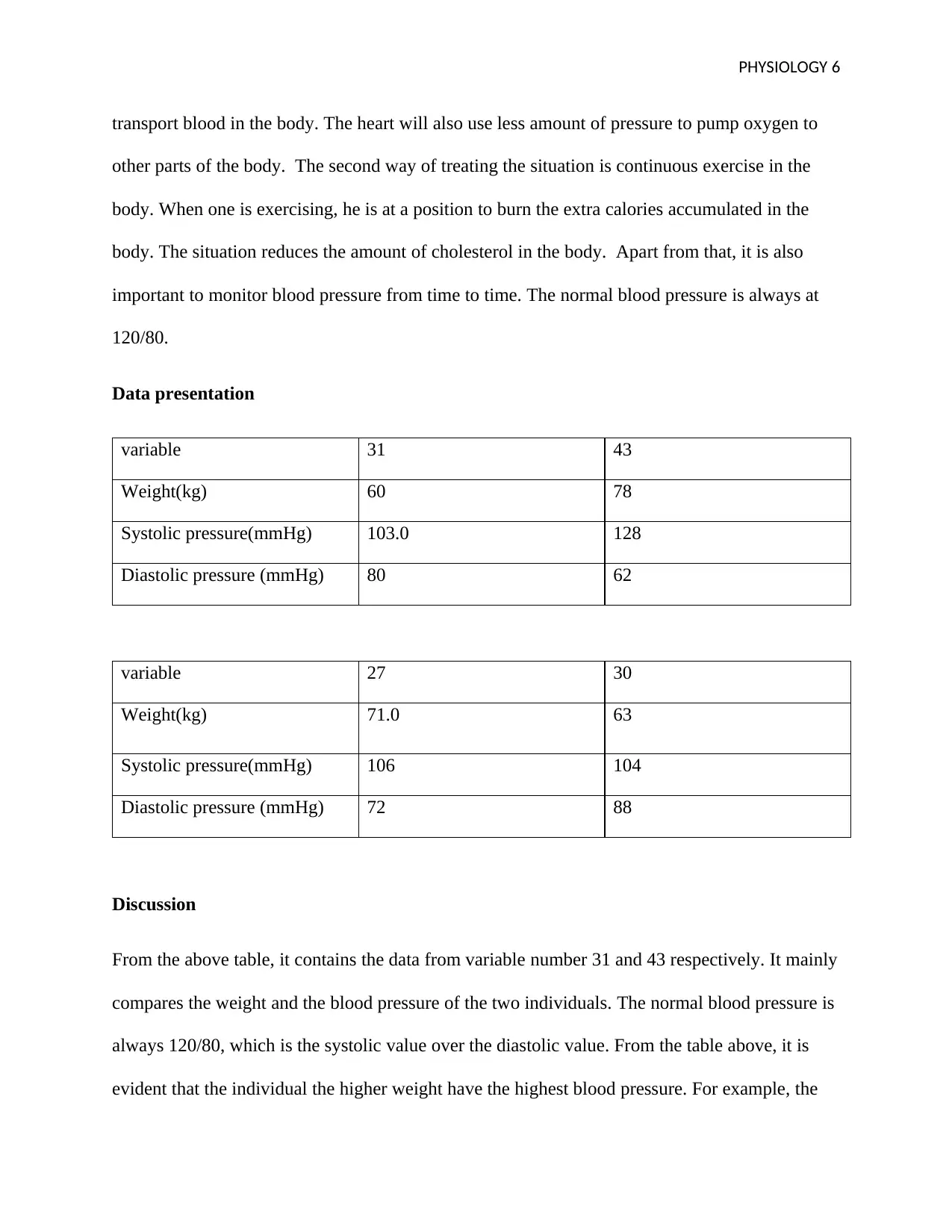
PHYSIOLOGY 6
transport blood in the body. The heart will also use less amount of pressure to pump oxygen to
other parts of the body. The second way of treating the situation is continuous exercise in the
body. When one is exercising, he is at a position to burn the extra calories accumulated in the
body. The situation reduces the amount of cholesterol in the body. Apart from that, it is also
important to monitor blood pressure from time to time. The normal blood pressure is always at
120/80.
Data presentation
variable 31 43
Weight(kg) 60 78
Systolic pressure(mmHg) 103.0 128
Diastolic pressure (mmHg) 80 62
variable 27 30
Weight(kg) 71.0 63
Systolic pressure(mmHg) 106 104
Diastolic pressure (mmHg) 72 88
Discussion
From the above table, it contains the data from variable number 31 and 43 respectively. It mainly
compares the weight and the blood pressure of the two individuals. The normal blood pressure is
always 120/80, which is the systolic value over the diastolic value. From the table above, it is
evident that the individual the higher weight have the highest blood pressure. For example, the
transport blood in the body. The heart will also use less amount of pressure to pump oxygen to
other parts of the body. The second way of treating the situation is continuous exercise in the
body. When one is exercising, he is at a position to burn the extra calories accumulated in the
body. The situation reduces the amount of cholesterol in the body. Apart from that, it is also
important to monitor blood pressure from time to time. The normal blood pressure is always at
120/80.
Data presentation
variable 31 43
Weight(kg) 60 78
Systolic pressure(mmHg) 103.0 128
Diastolic pressure (mmHg) 80 62
variable 27 30
Weight(kg) 71.0 63
Systolic pressure(mmHg) 106 104
Diastolic pressure (mmHg) 72 88
Discussion
From the above table, it contains the data from variable number 31 and 43 respectively. It mainly
compares the weight and the blood pressure of the two individuals. The normal blood pressure is
always 120/80, which is the systolic value over the diastolic value. From the table above, it is
evident that the individual the higher weight have the highest blood pressure. For example, the
⊘ This is a preview!⊘
Do you want full access?
Subscribe today to unlock all pages.

Trusted by 1+ million students worldwide
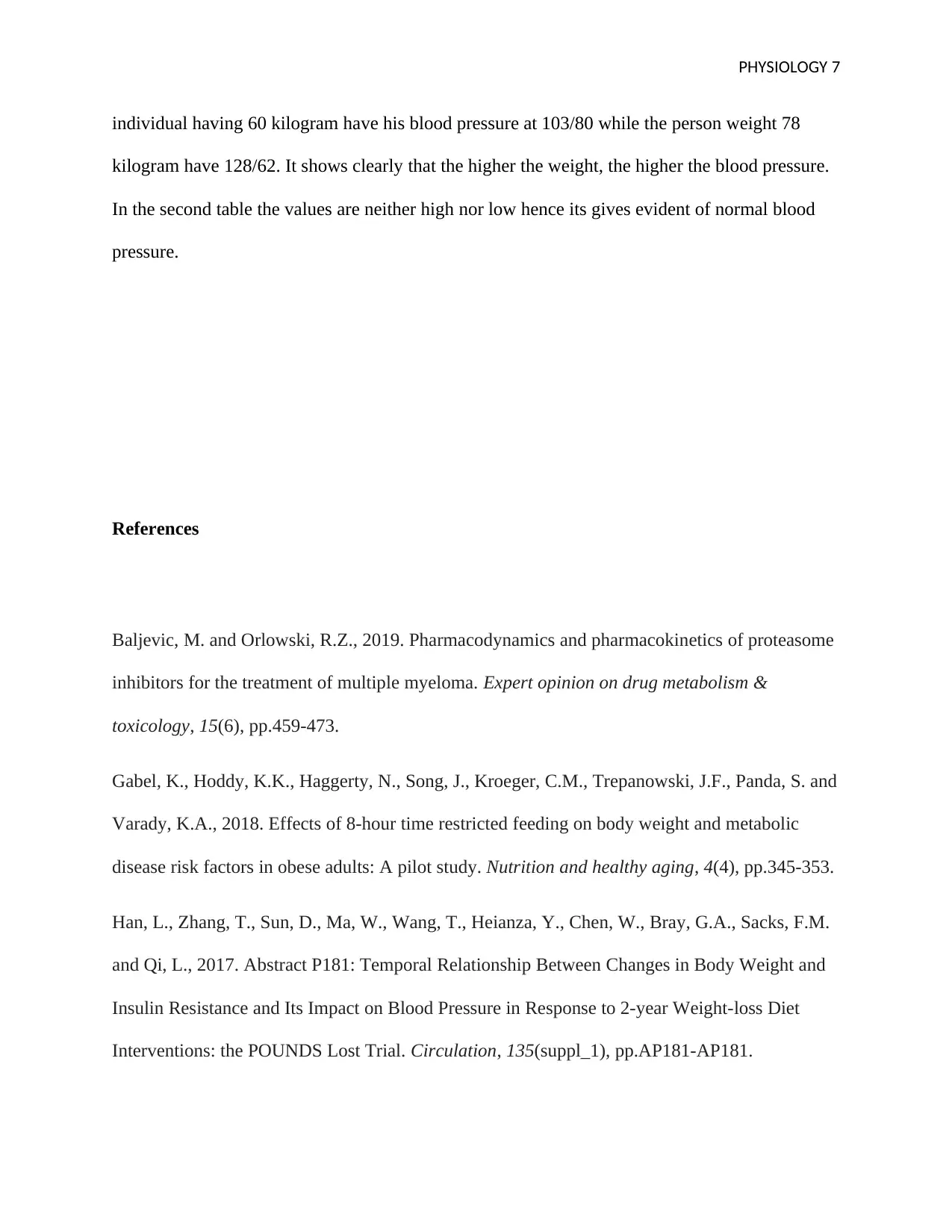
PHYSIOLOGY 7
individual having 60 kilogram have his blood pressure at 103/80 while the person weight 78
kilogram have 128/62. It shows clearly that the higher the weight, the higher the blood pressure.
In the second table the values are neither high nor low hence its gives evident of normal blood
pressure.
References
Baljevic, M. and Orlowski, R.Z., 2019. Pharmacodynamics and pharmacokinetics of proteasome
inhibitors for the treatment of multiple myeloma. Expert opinion on drug metabolism &
toxicology, 15(6), pp.459-473.
Gabel, K., Hoddy, K.K., Haggerty, N., Song, J., Kroeger, C.M., Trepanowski, J.F., Panda, S. and
Varady, K.A., 2018. Effects of 8-hour time restricted feeding on body weight and metabolic
disease risk factors in obese adults: A pilot study. Nutrition and healthy aging, 4(4), pp.345-353.
Han, L., Zhang, T., Sun, D., Ma, W., Wang, T., Heianza, Y., Chen, W., Bray, G.A., Sacks, F.M.
and Qi, L., 2017. Abstract P181: Temporal Relationship Between Changes in Body Weight and
Insulin Resistance and Its Impact on Blood Pressure in Response to 2-year Weight-loss Diet
Interventions: the POUNDS Lost Trial. Circulation, 135(suppl_1), pp.AP181-AP181.
individual having 60 kilogram have his blood pressure at 103/80 while the person weight 78
kilogram have 128/62. It shows clearly that the higher the weight, the higher the blood pressure.
In the second table the values are neither high nor low hence its gives evident of normal blood
pressure.
References
Baljevic, M. and Orlowski, R.Z., 2019. Pharmacodynamics and pharmacokinetics of proteasome
inhibitors for the treatment of multiple myeloma. Expert opinion on drug metabolism &
toxicology, 15(6), pp.459-473.
Gabel, K., Hoddy, K.K., Haggerty, N., Song, J., Kroeger, C.M., Trepanowski, J.F., Panda, S. and
Varady, K.A., 2018. Effects of 8-hour time restricted feeding on body weight and metabolic
disease risk factors in obese adults: A pilot study. Nutrition and healthy aging, 4(4), pp.345-353.
Han, L., Zhang, T., Sun, D., Ma, W., Wang, T., Heianza, Y., Chen, W., Bray, G.A., Sacks, F.M.
and Qi, L., 2017. Abstract P181: Temporal Relationship Between Changes in Body Weight and
Insulin Resistance and Its Impact on Blood Pressure in Response to 2-year Weight-loss Diet
Interventions: the POUNDS Lost Trial. Circulation, 135(suppl_1), pp.AP181-AP181.
Paraphrase This Document
Need a fresh take? Get an instant paraphrase of this document with our AI Paraphraser
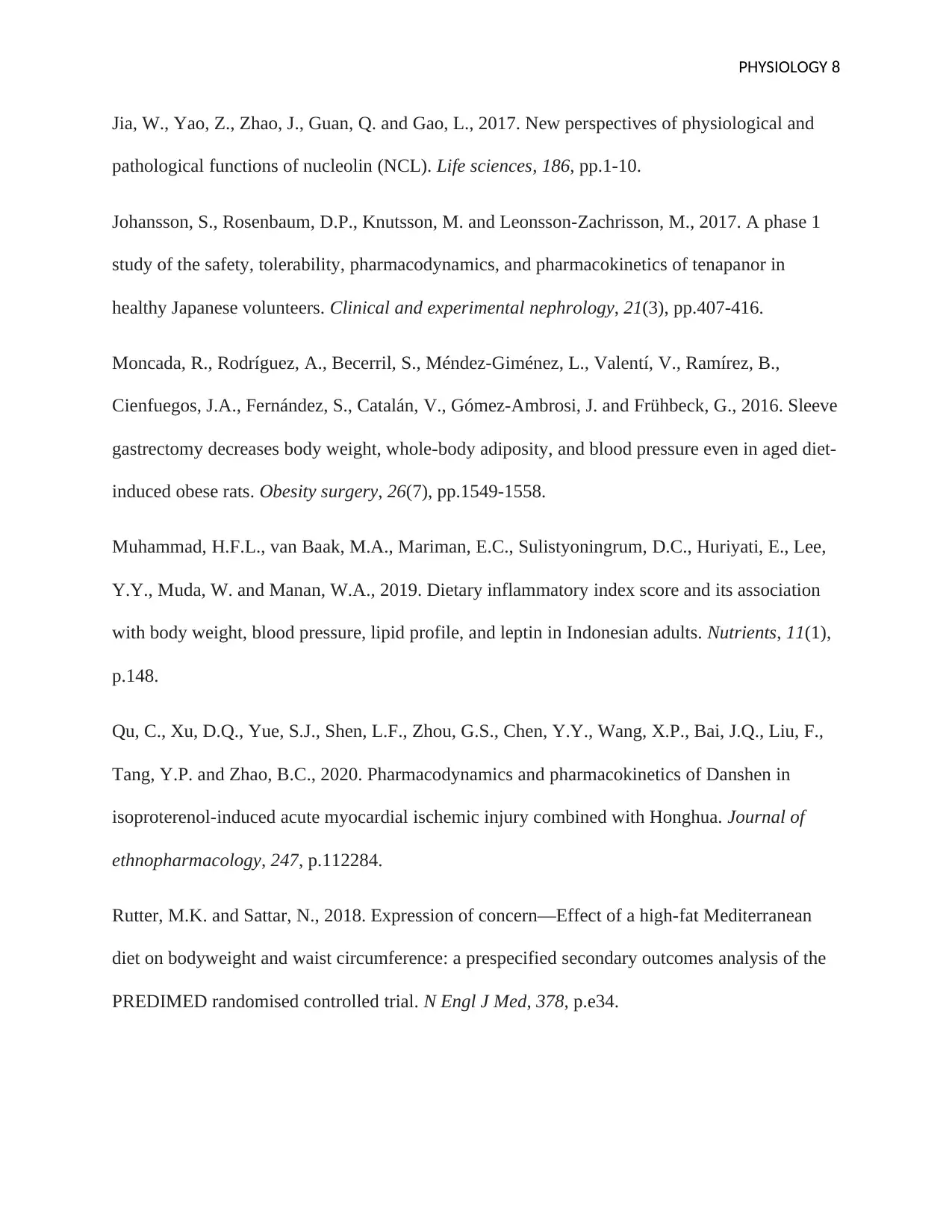
PHYSIOLOGY 8
Jia, W., Yao, Z., Zhao, J., Guan, Q. and Gao, L., 2017. New perspectives of physiological and
pathological functions of nucleolin (NCL). Life sciences, 186, pp.1-10.
Johansson, S., Rosenbaum, D.P., Knutsson, M. and Leonsson-Zachrisson, M., 2017. A phase 1
study of the safety, tolerability, pharmacodynamics, and pharmacokinetics of tenapanor in
healthy Japanese volunteers. Clinical and experimental nephrology, 21(3), pp.407-416.
Moncada, R., Rodríguez, A., Becerril, S., Méndez-Giménez, L., Valentí, V., Ramírez, B.,
Cienfuegos, J.A., Fernández, S., Catalán, V., Gómez-Ambrosi, J. and Frühbeck, G., 2016. Sleeve
gastrectomy decreases body weight, whole-body adiposity, and blood pressure even in aged diet-
induced obese rats. Obesity surgery, 26(7), pp.1549-1558.
Muhammad, H.F.L., van Baak, M.A., Mariman, E.C., Sulistyoningrum, D.C., Huriyati, E., Lee,
Y.Y., Muda, W. and Manan, W.A., 2019. Dietary inflammatory index score and its association
with body weight, blood pressure, lipid profile, and leptin in Indonesian adults. Nutrients, 11(1),
p.148.
Qu, C., Xu, D.Q., Yue, S.J., Shen, L.F., Zhou, G.S., Chen, Y.Y., Wang, X.P., Bai, J.Q., Liu, F.,
Tang, Y.P. and Zhao, B.C., 2020. Pharmacodynamics and pharmacokinetics of Danshen in
isoproterenol-induced acute myocardial ischemic injury combined with Honghua. Journal of
ethnopharmacology, 247, p.112284.
Rutter, M.K. and Sattar, N., 2018. Expression of concern—Effect of a high-fat Mediterranean
diet on bodyweight and waist circumference: a prespecified secondary outcomes analysis of the
PREDIMED randomised controlled trial. N Engl J Med, 378, p.e34.
Jia, W., Yao, Z., Zhao, J., Guan, Q. and Gao, L., 2017. New perspectives of physiological and
pathological functions of nucleolin (NCL). Life sciences, 186, pp.1-10.
Johansson, S., Rosenbaum, D.P., Knutsson, M. and Leonsson-Zachrisson, M., 2017. A phase 1
study of the safety, tolerability, pharmacodynamics, and pharmacokinetics of tenapanor in
healthy Japanese volunteers. Clinical and experimental nephrology, 21(3), pp.407-416.
Moncada, R., Rodríguez, A., Becerril, S., Méndez-Giménez, L., Valentí, V., Ramírez, B.,
Cienfuegos, J.A., Fernández, S., Catalán, V., Gómez-Ambrosi, J. and Frühbeck, G., 2016. Sleeve
gastrectomy decreases body weight, whole-body adiposity, and blood pressure even in aged diet-
induced obese rats. Obesity surgery, 26(7), pp.1549-1558.
Muhammad, H.F.L., van Baak, M.A., Mariman, E.C., Sulistyoningrum, D.C., Huriyati, E., Lee,
Y.Y., Muda, W. and Manan, W.A., 2019. Dietary inflammatory index score and its association
with body weight, blood pressure, lipid profile, and leptin in Indonesian adults. Nutrients, 11(1),
p.148.
Qu, C., Xu, D.Q., Yue, S.J., Shen, L.F., Zhou, G.S., Chen, Y.Y., Wang, X.P., Bai, J.Q., Liu, F.,
Tang, Y.P. and Zhao, B.C., 2020. Pharmacodynamics and pharmacokinetics of Danshen in
isoproterenol-induced acute myocardial ischemic injury combined with Honghua. Journal of
ethnopharmacology, 247, p.112284.
Rutter, M.K. and Sattar, N., 2018. Expression of concern—Effect of a high-fat Mediterranean
diet on bodyweight and waist circumference: a prespecified secondary outcomes analysis of the
PREDIMED randomised controlled trial. N Engl J Med, 378, p.e34.
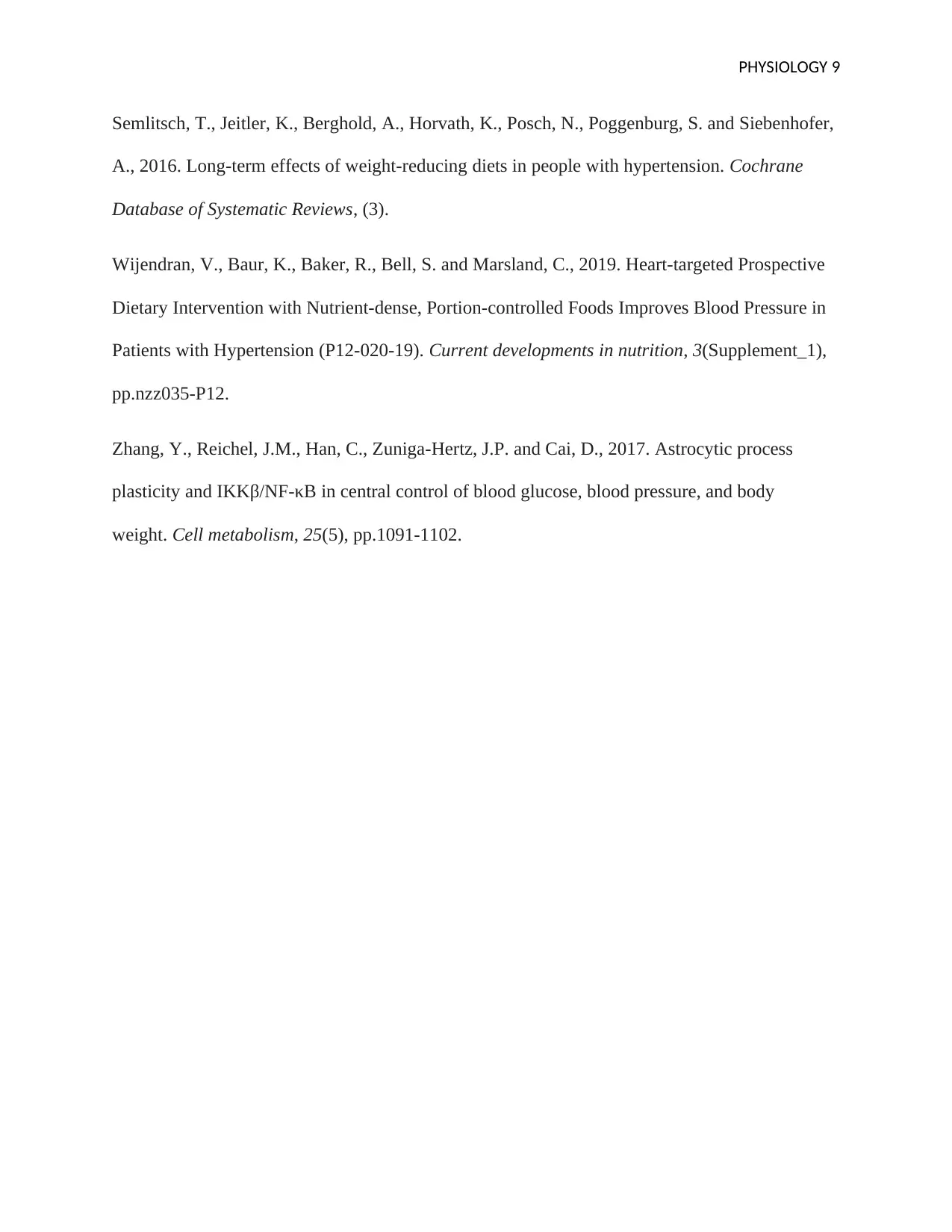
PHYSIOLOGY 9
Semlitsch, T., Jeitler, K., Berghold, A., Horvath, K., Posch, N., Poggenburg, S. and Siebenhofer,
A., 2016. Long‐term effects of weight‐reducing diets in people with hypertension. Cochrane
Database of Systematic Reviews, (3).
Wijendran, V., Baur, K., Baker, R., Bell, S. and Marsland, C., 2019. Heart-targeted Prospective
Dietary Intervention with Nutrient-dense, Portion-controlled Foods Improves Blood Pressure in
Patients with Hypertension (P12-020-19). Current developments in nutrition, 3(Supplement_1),
pp.nzz035-P12.
Zhang, Y., Reichel, J.M., Han, C., Zuniga-Hertz, J.P. and Cai, D., 2017. Astrocytic process
plasticity and IKKβ/NF-κB in central control of blood glucose, blood pressure, and body
weight. Cell metabolism, 25(5), pp.1091-1102.
Semlitsch, T., Jeitler, K., Berghold, A., Horvath, K., Posch, N., Poggenburg, S. and Siebenhofer,
A., 2016. Long‐term effects of weight‐reducing diets in people with hypertension. Cochrane
Database of Systematic Reviews, (3).
Wijendran, V., Baur, K., Baker, R., Bell, S. and Marsland, C., 2019. Heart-targeted Prospective
Dietary Intervention with Nutrient-dense, Portion-controlled Foods Improves Blood Pressure in
Patients with Hypertension (P12-020-19). Current developments in nutrition, 3(Supplement_1),
pp.nzz035-P12.
Zhang, Y., Reichel, J.M., Han, C., Zuniga-Hertz, J.P. and Cai, D., 2017. Astrocytic process
plasticity and IKKβ/NF-κB in central control of blood glucose, blood pressure, and body
weight. Cell metabolism, 25(5), pp.1091-1102.
⊘ This is a preview!⊘
Do you want full access?
Subscribe today to unlock all pages.

Trusted by 1+ million students worldwide
1 out of 9
Related Documents
Your All-in-One AI-Powered Toolkit for Academic Success.
+13062052269
info@desklib.com
Available 24*7 on WhatsApp / Email
![[object Object]](/_next/static/media/star-bottom.7253800d.svg)
Unlock your academic potential
Copyright © 2020–2026 A2Z Services. All Rights Reserved. Developed and managed by ZUCOL.




